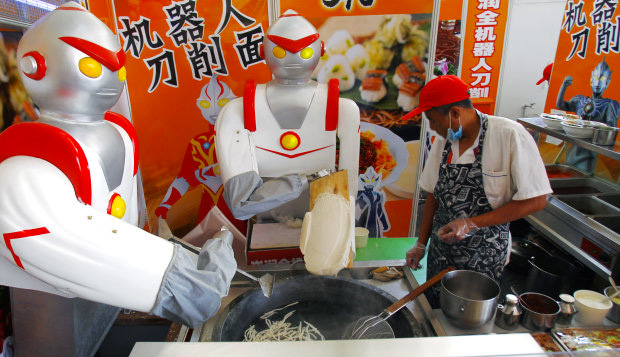
Last night I was thinking about the SMELL of an office. Normally offices don’t smell like much, except for at lunchtime, when there’s this nauseating smell of microwaved meals. It’s a savory smell of preformed chicken, warm plastic, and ramen noodle spice packets. It wouldn’t even bother me so much, except that it’s been designed in a lab to tug at my appetite. So I breathe it in and am tricked for just a moment into thinking that it’s something I could eat. Is that a carbohydrate, mushy noodles with a hint of sweetness? Especially since this smell is wafting through the cube farm around noon and maybe I haven’t eaten yet. But then it pervades my palate, and the stale, processed nature of it hits me. Are the amino acids of that savory protein intact? Probably not.
There is nothing fresh to eat in an office. Oh sure, they bring in some delivered produce once a week, encased in plastic, the apples turning brown moments after I cut into them, leached of all antioxidants by months in cold storage. Everything is on a conveyor belt, really. The workers are moved into the building by rapid transit systems. The frozen meal energy units are stamped out and packaged using some hellish alchemy that approximates nutrition to the minimum federally mandated standards. The work product generated by these meals is emails and documents, packets of drudgery routed across vast global computer networks and spewed into the faces of recipients via glowing screens, lighting up our faces with blue light as we digest the mediocrity. And afterwards, we eliminate the waste product in a corporate bathroom, squatting side by side in merciless stalls with huge gaps that deny us privacy. All systems optimal and functioning as designed.
But when I try to go out for lunch, my frugal companions scowl at my madness. How will I ever afford a house in the Bay Area if I squander my dollars on such extravagance? No, no, we office drones must scrimp and save every penny. Get a CostCo card and a big freezer. Buy in bulk. How will I afford children? And I ignore them because I want a breath of fresh air, at least. I know the food at the restaurants won’t be any better, though I did have a client down on Second Street in San Francisco with an organic salad place across the street. SF systems require somewhat better fuel inputs to produce slightly less mundane work output.
But the average corporate lunch place, even here in the Bay Area, is nothing like that. Lunch in the corporate world illustrates the depth of our descent. White bread sandwiches with processed meats, canned soups, iceberg lettuce salads with trans fat dressings. And don’t get me started on the decor. Fluorescent lighting, travel photos of a beach with palm trees, faded by the sun coming in the window, a damaged dream of escape from the grinding routine of a systemized society. So eat quickly or maybe just take your food to go and eat at your desk. So much to do, so little time. Choke down the calories, get on with it. You do want your job, don’t you?
I notice the rare smokers I pass as I come back from lunch. Only the smokers seem to take regular outdoor breaks in the corporate world, driven by the monkey on their backs to suck down carcinogens. Do you know that nicotine actually improves cognitive function somewhat? I assume the benefits are largely offset by the reduced lung function, but I haven’t looked into it.
And the higher up the status tree we climb, the fiercer the competition becomes. In the ruthless furnace of Silicon Valley startup culture, white bread sandwiches are replaced by intermittent fasting. Nicotine is a lowly nootropic. Get your uridine stack in place and drive that motivation. Pop the Modafinil and FOCUS, people, FOCUS. Ship that code. Build your brand. Sink or swim, motherfucker. Always Be Closing. The Bay is a churning mass of wrestling bodies, competitors striving and scratching all around you, clutching at any advantage. Is it any surprise that the psychopaths inevitably rise to the top?
But these modernists look at me askance when I say that maybe these systems are failing. They are unsustainable environmentally and financially. They are bereft of meaning, commoditizing all human experience. It may be that the gears of these mighty systems around us will simply fall apart and fail as a consequence. Humans have needs unfulfilled by these processes. We need better nutrition, we need to be outside moving around basically all of the time. We need some meaning, a supportive community, we need to cut each other some slack. That’s my futurism.


